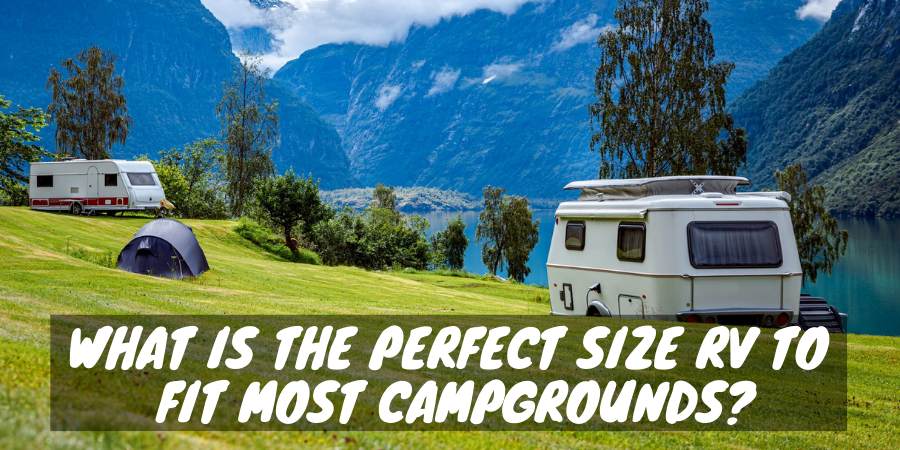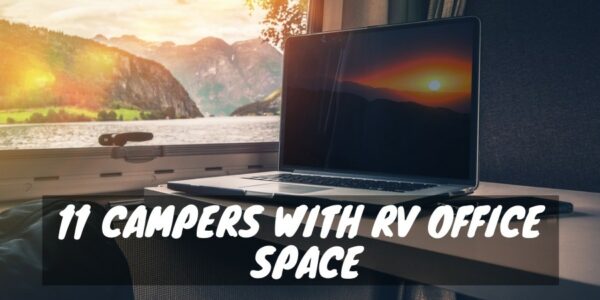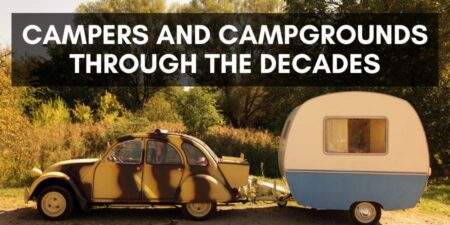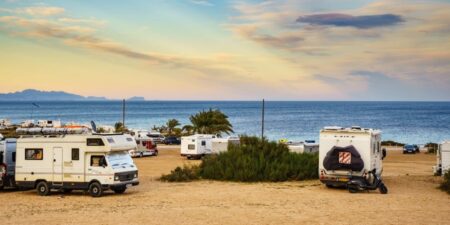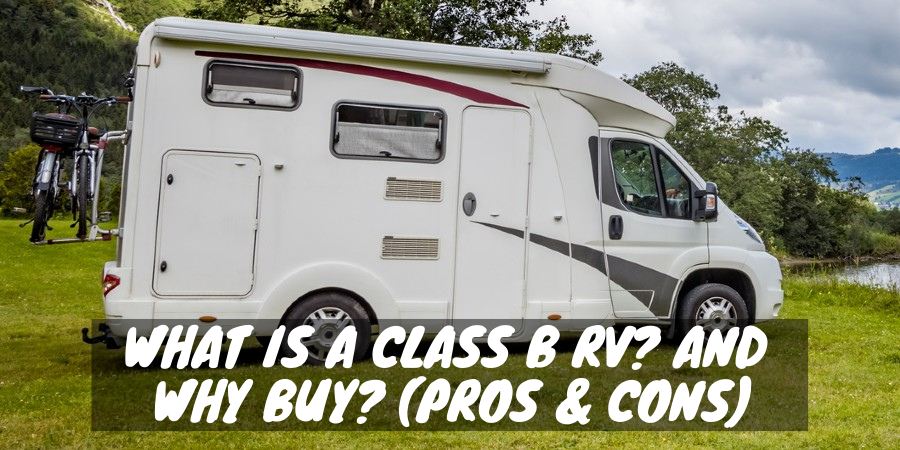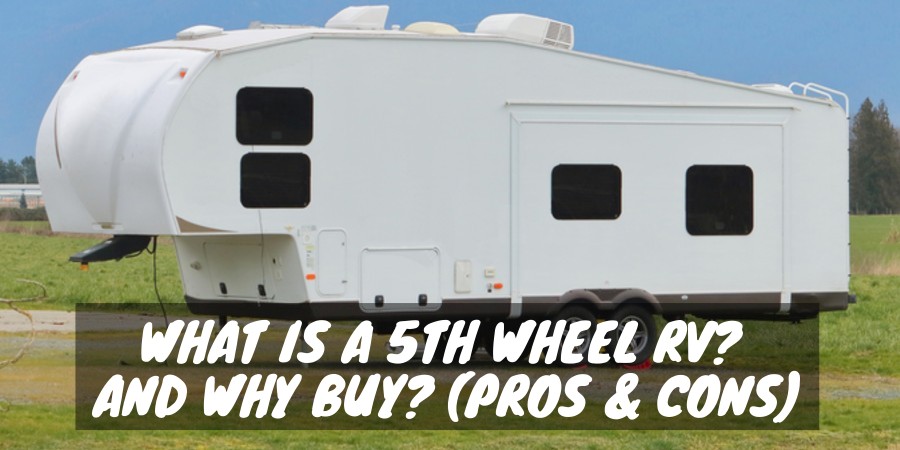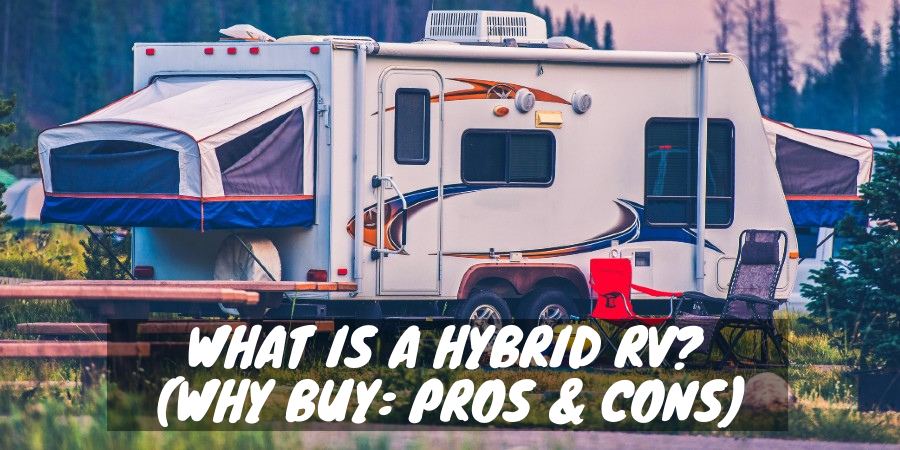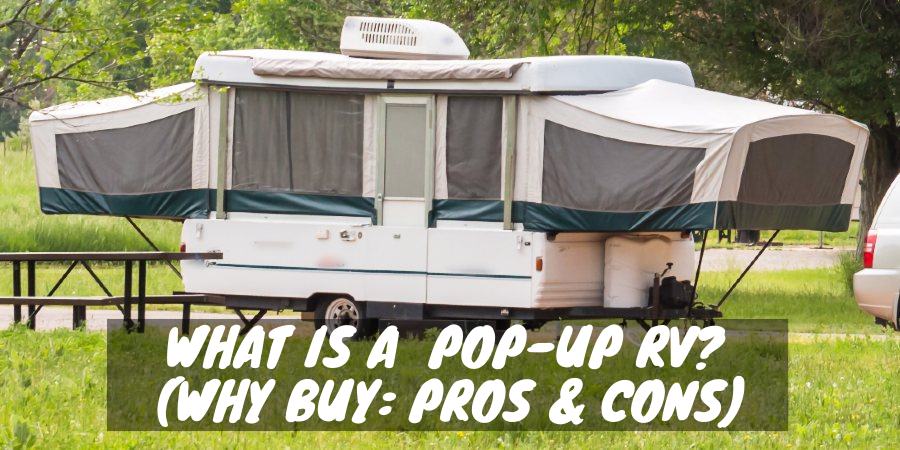Nothing puts a damper on your RV trip like finding out the campground you were hoping to stay at doesn’t have a spot for your large motorcoach, fifth-wheel, or travel trailer.
Many new RVers are unaware that not every campground has campsites to fit every size RV. Most new RV buyers opt for the largest camper they can afford, only to regret their decision later.
Why?
Because it doesn’t take long visiting campgrounds to realize that if you want to have the most luck booking a spot, you’re RV should ideally be in the 25-foot range.
But there’s more to size than you think, so come along as I break down what the perfect size RV to fit most campgrounds entails.
The Perfect Size RV for State and National Campgrounds
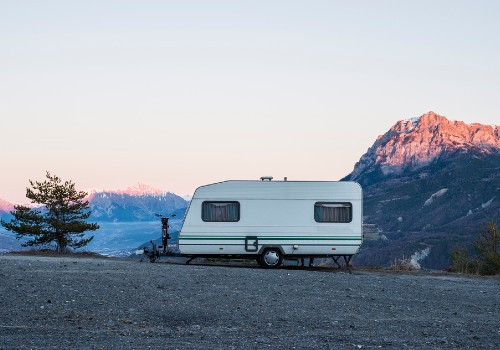
I really like state and national park campgrounds because they are very similar in layout, and their nightly prices are affordable.
While the terrain may vary, the sizing of campsites tends to remain constant throughout the state parks. National parks also seem to follow the same blueprint across the country.
This factor means that when trying to choose the perfect size RV, the statistics are readily available for comparison, and I condense the information below.
The Perfect Size RV for State Parks
After exhaustive research, I find that the perfect size camper for state parks with RV parking is 27-feet or under. Of course, the smaller your RV, the easier it will be to fit into any site.
When making a booking, make sure you indicate whether you will arrive in a motorhome or a travel trailer. The search engine will adjust what sites are available if it must accommodate a tow vehicle.
State parks are different when it pertains to RV campgrounds as each will have their own standard campsite dimensions.
For example, if you go to one campground that will fit your 35-foot RV, you can expect the other campgrounds within that state to have sites to fit you as well.
When budgets allow, states are trying to increase the size of RV sites to fit larger campers to keep up with the current needs of their customer base. This type of improvement is slow to materialize, so keep it in mind when deciding what size RV to purchase.
Unfortunately, different states’ campground size restrictions mean you’ll need to research each park to verify if your RV will fit when taking a cross-country trip.
The Ideal Size RV for National Parks
Statistics on campsite dimensions for all of the national parks in the US shows that if your RV is 12-foot long or under, such as with pop-up or teardrop-style campers, you will fit into 100-percent of the offerings.
Do note that this is for national park campgrounds that allow RVs, as some are strictly for tent camping.
While this information is useful to know, most people or families will find camping in such a small RV problematic and will want a larger rig.
By moving up to a travel trailer or motorhome that is around 25-feet in length, you can enjoy more space and amenities inside your camper while still fitting into 93-percent of all the park’s RV campground sites.
If you feel you need more room for your family, an RV up to 32-feet in length will still fit into 81-percent of the national park campgrounds, which are always good odds.
Now, when you move the size of your RV up to 40-feet long, and the number drops to only 53-percent.
Not only are there fewer spots to house large RVs, but you’ll also have to compete with all the other owners looking to book a space. If you don’t make reservations several months out, especially for summer or holiday travel, you most likely can’t secure a site at all.
Keep in mind that these stats are a compilation of all the parks across the US.
Regionally, there may be campgrounds with zero spots for RVs over 30-feet, or you may have parks with updates to their campgrounds that allow the majority of their sites to house large RVs.
The Perfect Size RV for Private or Corporate Run Campgrounds
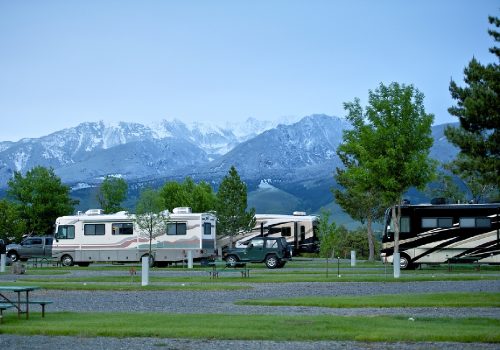
There are no statistics for average campsite sizing across all the thousands of private or corporate-run campgrounds across the US.
Most, if not all, campgrounds will have sites to fit all size RVs from small to extra large.
But, relying on personal experience while full-time RVing for years, I believe a camper 30-foot or under is the perfect size RV to fit most private campgrounds.
For example, one of my favorite RV parks has 110 campsites, but only seven of those can fit an RV over 40 feet. Ten other sites are strictly for RVs under 20 feet long, but the rest are open for campers between 20 and 40 feet long.
Across the board, I have to say this is a standard ratio for campsite sizing at private or corporate campgrounds. Expect a small number of campsites to fit large RVs, and the majority to accommodate motorhomes or travel trailers between 15 to 30 feet.
I find the newer the campground, the longer the sites, so management has more options to book large RVs.
Perfect Campgrounds to Fit Large RVs
Ok, you want the biggest RV so you can camp in comfort. But, you don’t want to spend hours searching for campgrounds that will fit your massive motorhome, fifth-wheel, or travel trailer.
For people with RVs 40-foot and above, you can enjoy camping at plenty of RV parks that easily accommodate large recreational vehicles.
Several websites feature the best campgrounds that fit large RVs, with updates as information changes.
The US RV Guide for Big Rigs is one site that details locations across the country to camp, along with helpful details on where to fuel up and more.
You can access the digital information by signing up online or order the book with maps that showcase all the campgrounds across the US and eight Canadian provinces that will accept your big RV.
If you’re looking for a luxury RV resort vacation, you can find a list of campgrounds here at the RVShare website.
Campground RV Length Restrictions
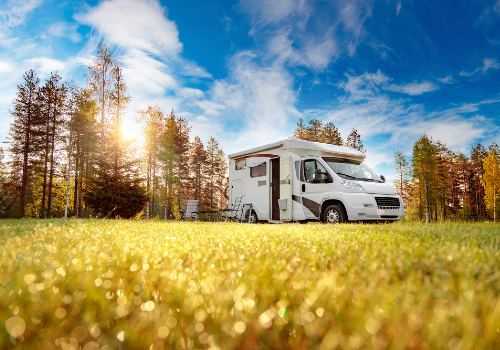
What determines RV length restrictions in campgrounds?
The parking pad’s size and natural features, such as trees, water, or rocks, will limit the space available to park an RV. Easy access to water, sewer, and electrical connections also play a role in RV length restrictions on any particular campsite.
A cement RV parking pad at most campgrounds is typically 10 to 12 feet in width, and the length averages between 20 to 50 feet. RV hookups will generally be toward the back of the pad.
Some parks have the space available to create pads that are 100 feet long, and therefore can easily fit a 45-foot motorcoach plus a toad, with room to spare.
Parking on gravel or grass expands the length of RV that can fit into a campsite, but you may need extra lengths of electric cord or water or sewer hose to reach the power pedestal and connections.
RVers love their shade, so keeping trees around campsites is a high priority for campground management. Expect RV sites in woody areas to be shorter in length.
In regions where trees aren’t as abundant, you may find lots of long, pull-through campsites because the landscape isn’t restricting the parking pad’s size.
How do campgrounds measure trailer length?
Want to Connect With a Community of Over 1,078 RV Enthusiasts?
A campground will measure a trailer length from the back bumper to the front of the hitch or tongue and not the unit’s actual box dimensions.
New RVers may find this confusing because RV dealerships will state an RV length to be the area that is within the box, or the living portion, of the camper.
When a campground posts a campsite will fit a 30-foot RV, that can mean any motorhome 30-foot or shorter.
Travel trailers are different. For example, if your travel trailer is 30-feet with the tongue, plus you have a tow vehicle, that would exceed the campsite’s 30-foot length.
While some campsites will have extra space to squeeze in your tow vehicle off to the side of your camper, you may have to park it elsewhere to keep lanes clear.
If your travel trailer is 12-feet long and your tow vehicle is 16-feet long, the total length (including tongue and hitch) will just fit so that you can leave your vehicle on site.
Knowing that any tow vehicle counts in length dimensions matters when booking campsites as it often pushes people outside of length restrictions. If you have a 45-foot motorhome and tow a toad, it can be challenging to secure a site ample enough to handle them both.
Most campgrounds have overflow parking available and encourage you to leave tow vehicles there instead of cramming up campsites.
Trying to squish in your giant heavy-duty truck can be dangerous to everyone else trying to navigate the park with their campers.
Never park a car or tow vehicle on the grass (especially at the state and national parks) unless instructed by management. It’s also a huge no-no to park between your camper and a neighboring camper.
Maximum RV Length By State
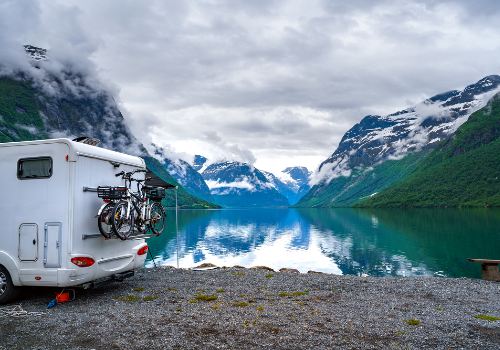
Many people are unaware that all states have a maximum length restriction on vehicles traveling down the roadways, which include the RV and towable.
Most restrict motorhome length to 45-feet in size, while states like Montana allow rigs up to 55-feet long.
I have no idea how often RVs are pulled over for violating length rules or what each state allows for towing behind your camper.
On one trip through the mountains of West Virginia, I was passed by a 40-foot motorhome towing a box trailer that was then towing a boat. It was well exceeding 70-feet in total length!
I was stunned the police let this thing drive on the road as it certainly didn’t seem safe, but maybe it was well within the law.
I was simultaneously impressed the driver had the guts to maneuver that mess through the tight turns and steep grades while I was creeping along in the slow lane in my RV.
It’s always smart to verify length and towing rules with each state you may travel through while RVing to ensure you won’t be violating local laws. Nobody wants a ticket or an accident while on vacation.
Conclusion
For those who love to camp and have experience at RV parks across the country, it becomes evident that an RV between 16-25 feet is a perfect size to fit most campgrounds.
The best thing about motorhomes or camping trailers in this size range is that they are spacious enough to be comfortable (especially those with slideouts) and offer you the best chances you’ll find a campsite that can accommodate it anywhere you go, even if you don’t have a reservation.
Why worry your camping plans may not go off as expected? Use the information above to make a logical RV length selection that best suits your needs so you can nearly guarantee years of carefree campsite bookings!
"Man cannot discover new oceans unless he has the courage to lose sight of the shore."
-- Andre Gide

